|
THE INVISIBLE TOUCH
Is the forgotten iPod
the future of gaming?
Everyone in the gaming world is getting
pretty excited about the apparent
runaway success of the iPhone. Big publishers are thrilled at
the digital-delivery model which frees them from the huge costs and
uncertainties of boxed products. Small developers are overjoyed at
the speed and ease with which it's possible to create games and make
big money out of them. Gamers are delirious at being able to
pick up
fantastic titles for literally
pennies (or even for
free), with even the
priciest
of releases still costing less than an 800-point XBLA game. And
you'd have to imagine that even the miserable, greedy old men of
ELSPA and the ESA are happy, since the Apple business model all but
wipes out piracy, and wipes it out in the only way it ever could
be wiped out - voluntarily, because when games cost 59p you'd have
to be some sort of raving mentalist to mess around riskily with your
console's firmware to copy them illegally.
(Mind you, you can't rule anything out
where the be-suited dinosaurs are concerned. The first comments on
the Peggle story linked above reflect a very common, and weepingly
stupid, attitude within the industry. Even though Popcap made MORE
money by selling Peggle at a sixth of the price, it still drew
widespread criticism from idiots complaining that the low price was
somehow damaging to the market. Because God forbid that lots of
people should get to play excellent games and pay money for them,
eh?)
But anyway. Today, because it's cloudy
outside and there's nothing on the telly, we're going to take a look
at the implications of the iPhone for the world of games, and see if
it really is the future. And the first thing we're going to do is
not talk about the iPhone.
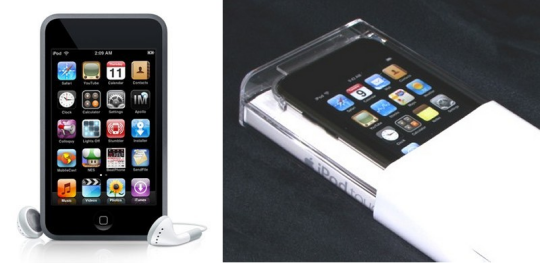
Can you tell which is the iPhone and which is
the iPod Touch? There's a clue in the pic.
Because the iPhone isn't the future of
games. The iPhone is horrifically expensive - if you want one
on a Pay As You Go tariff the cheapest model is a wallet-violating
£342, increasing to a heart-stopping £538 if you want the 32GB
top-of-the-range job. And on a contract you'll still pay almost £200
for the middle version, with another £630 on top by the time you've
completed the minimum 18-month contract. You can get a far better
phone, with a touch-screen interface, a vastly superior camera and
excellent media-playing capabilities, for hundreds of pounds less
than the life-of-contract cost of an iPhone. (And you wouldn't have
to use iTunes, but more on that later.) Essentially, anyone who buys
an iPhone in Europe is still a bit of an idiot.
But the iPhone's much-less-lauded
little brother the iPod Touch is a different bottle of sausages
altogether. The Touch is the forgotten iPod - as well
as being overshadowed by its near-twin, it's light on memory
compared to the iPod Classic (which offers 15 times as much storage
space as the 8GB Touch for slightly less money), and big and
unwieldy compared to the Nano (whose 16GB model is barely over
one-third of the size of the Touch, and £60 cheaper for the same
amount of storage). In short, you'd have to have considerably more
money than sense to buy one as an MP3 player. But as a games
machine the iPod Touch gets a whole new lease of life, and
becomes a very interesting proposition indeed.
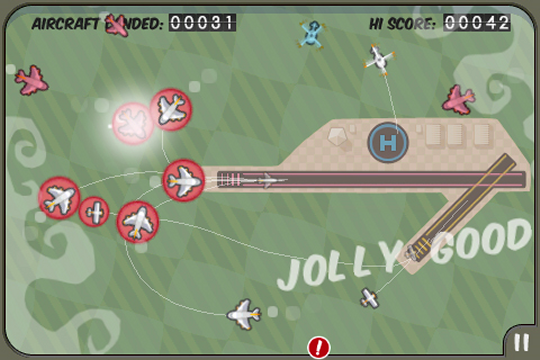
This feature has already gone too long without
a screenshot of Flight Control.
The iPod Touch doesn't require a
contract, and if you want one purely and solely as a games machine
you'll be fine with the 8GB version, which will hold hundreds of
games and can be bought for only
about £15 more than the price of the new DSi and £25 more than the
latest PSP. (Of course, if you're a
WoS subscriber you can still get a 16GB Touch for just £5, but
that's another matter entirely.) That extra cost is
countered almost instantly by the fact that iPod games are a tiny
fraction of the price of those for the other two handhelds, and from
your third game onwards the iPod is actually a much cheaper gaming
platform.
It's strange that Apple haven't pitched
the Touch more aggressively as a games machine. Until recently I'd
never even considered it in that context, and I had to do a fair bit
of asking around to discover how gaming-friendly it was when not
connected to a phone network, but the answer is that it's very
gaming-friendly. If you have a wireless router for your computer it
connects incredibly easily to your home PC network (far, far more
simply than any of my other gaming machines did - getting the 360,
PS3, DS and PSP hooked up was vastly more troublesome), enabling you
to download games directly from the App Store in seconds. If you
don't have a wireless network, you simply download the games via
iTunes, then plug your iPod into a USB port and transfer them to the
Touch from there with a single click.
Unlike the 360, PS3 and Wii there's no
twatting around buying "points" or pre-loading your account with
irritatingly unflexible amounts of money - you just register a
credit or debit card with the App Store and it takes the appropriate
cash when you buy something. (Unlike the PS3, where to buy something
costing 99p you have to deposit a non-returnable £5 and just hope
you find another £4.01's worth of stuff to buy in the future.) You
don't need to remember credit card numbers or security codes, just
your App Store password.
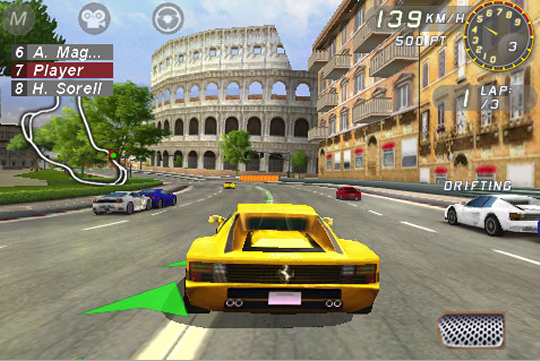
You didn't think the iPod had "proper' racing
games, did you?
So it's easy to buy games. What about
playing them? iPhone/iPod games are often criticised for the
limitations of the no-buttons interface, and it's true that the
touchscreen simply isn't suitable for certain types of game. For
example, while the format has a lot of wannabe Geometry Wars clones,
they all suffer from the lack of tactile feedback. Having two
virtual joysticks on the screen just doesn't work properly, because
there's no way of sensing when your thumbs are about to stray out of
the input zone and leave your ship heading off on its own
initiative. (And in most cases, your thumbs also obscure important
areas of the screen.)
But assuming a modest degree of
developer intelligence, almost all game genres can be adapted to
work very successfully, using various combinations of the
touchscreen and tilt sensors. Driving games, for example, can use
tilt to steer and onscreen pedals for accelerate and brake. Or they
can use the touchscreen for steering (either by touching the edges,
or moving a slider or an onscreen wheel), and tilt forward and back
for the pedals. Or in many cases, you can opt for automatic
acceleration and control your speed by braking alone. (Pictured
above, as one of several control choices in the rather fine Ferrari
GT Evolution.)
My personal favourite example of
lateral interface thinking, though, is the brilliantly ingenious
control in the excellent colour-flipping platform puzzler Shift.
Running and jumping is handled with just two context-sensitive
buttons - if you're running left (as in the picture below) the right
button instantly and automatically switches to a jump button, and
vice versa. (Because after all, you never need to run both right and
left at the same time, do you?) It's a fantastic bit of design, and
makes the iPod version of the game about ten times more enjoyable to
play than the Flash PC
original with its
awkward four-fingered layout.
There's still the
occasional blind spot, of course. Despite several pretty respectable
attempts like Siberian Strike and iFighter - and of course Platypus
by WoS' own Anthony Flack - the iPod isn't really built for the
control precision of scrolling shooters.
Then again, there are hardly any of those on the DS or PSP either.
The fact is, the iPod's controls are easily capable of handling
the vast majority of modern genres, and the format offers quality
examples of most.
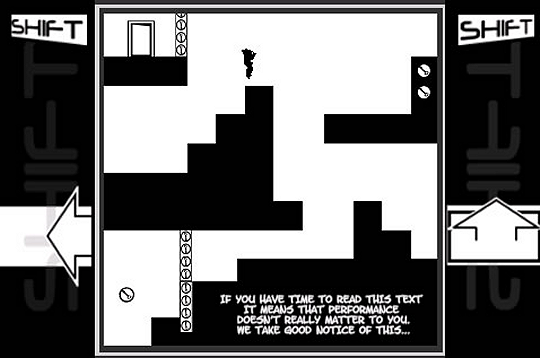
Shift is absolutely lovely, and just one of the
many great iPod games sold for 59p.
It's pretty clear, then, right? We've established beyond reasonable
doubt that the iPod is the finest handheld games console known to
man and you should rush out and buy one right now, yeah? Well, kinda.
But so far in this analysis we've overlooked at least two
crucially-important features, and both of them make a fairly
substantial dent in the iPod's gaming credentials.
The first is
battery life. The iPod takes portable gaming almost all the way back
to the dark days of the Game Gear and the Atari Lynx. Even at a
pretty modest brightness setting, you'll be doing well to get more
than a couple of hours of gaming out of a full charge before the
iPod conks out. (And unlike the Lynx and Game Gear, you can't just
carry a couple of spare packs of AAAs with you.) It's a nasty
surprise, given that the machine will play music for most of a day
without needing a mains power lifeline, but that backlight really
burns up the battery, and while recharging takes barely half an hour
that's a fat lot of use if you're stuck on a train. At under half
the playing time of a DS or PSP, it's a serious shortcoming if you
plan to do most of your handheld gaming outside of the home. (Though
to be fair two hours between charges is probably plenty for the
average commuter working in an office.)
The second of the
two big issues set against the iPod is that realistically you need
to own a computer if you're going to play games on it. But although
you COULD, strictly speaking, just wait until you were within a
public wi-fi access point to buy games - and I don't suppose having
to go to the local library to buy iPod games is really any different
to having to go into town to buy DS or PSP ones - that's not the
real problem anyway. The real problem is that most people who own a
computer have a PC, and Apple really, really hates people
with PCs.
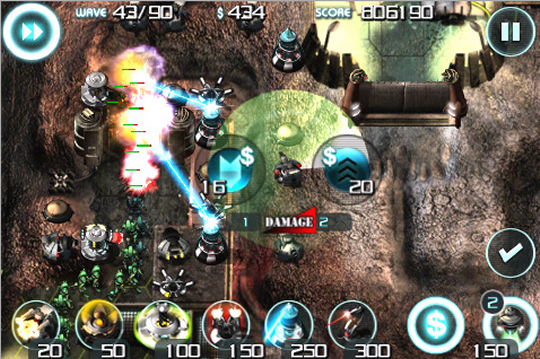
Apple desperately attempting to fend off PC
owners trying to give them money.
Apple's hatred of PC owners mainly
manifests itself in the form of iTunes. Apparently a lovely and
friendly utility when in its natural habitat on the Mac, iTunes on
the PC is one of the most abominably wronged-up and evil pieces of
software ever to achieve widespread use.
iTunes is bad enough when it's just
trying to manage your music library. As WoS discovered to its cost,
literally a single mouseclick two pixels away from where you meant
to click on an innocent playlist screen will completely destroy your
entire music and video library without so much as a single "Are
you sure you want to do this?", and with absolutely no means of
recovery unless you buy expensive third-party software and back it up in advance. But
when it comes to handling your games, astonishingly iTunes somehow
contrives to achieve levels of cretinous, spectacularly incompetent
stupidity that are even worse than that.
WoS recently bought a new PC, and
diligently and carefully backed up its entire iTunes library
(including all apps and games) before attempting the transfer.
Restoring everything to the correct folders on the new machine, WoS
loaded up iTunes, took a deep breath and clicked "Sync iPod". 1000
of 1100 songs made it across safely, with only one folder having to
be rescanned manually, for no very good reason but still only a few
seconds of effort. A glance at the iPod's screen, though, revealed
that a very different fate had befallen the games folder.
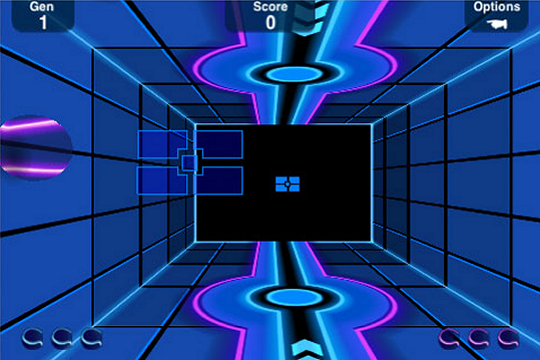
iTunes and the iPod itself are essentially at
war, like Tron and the MCP.
Apple irritatingly insist on
"authorizing" each computer on which you want to run iTunes,
presumably as some sort of DRM cobblers. While in itself that's a
simple matter of typing in your account name and password, iTunes
doesn't bother alerting you if you're running it for the first time
on a new machine, even if you've just told it to do something as
potentially disastrous as run a sync operation. (In which anything
on your iPod which isn't also on iTunes gets deleted without any
confirmation, even if you've ticked the box that says "Alert me
if I attempt any operation that will change more than 5% of my total
content".)
Instead, what iTunes does is this: it
wipes your app folder completely, and then casually says "Oh,
this computer wasn't authorized, so I deleted everything off your
iPod. Hope that's okay".
(WoS has had to take a short breather
to calm down again just after typing that. Imagine the scenes when
it actually happened, if you think you can handle it.)
And amazingly, viewers, that's not the
worst of it. Because I'd made a backup I still had all the original
app files, so it wouldn't be too much of a palaver to re-sync them
back on once I'd authorized the PC, right? Well, up to a point. But
the worst of it wasn't even the three solid hours of faffing around
with the absolutely dreadful Applications window in iTunes. Nor was
it the
slow, painstaking deletion from that same Apps window of countless
unwanted apps that
I'd previously deleted from the iPod itself - in order to prevent
them from being reinstalled by a new sync - that were necessary
before I could get all my games back onto the iPod.
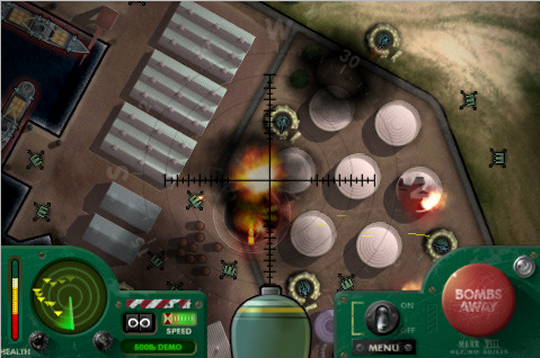
WoS lines up the bombsight over the Apple
firmware-development campus.
Y'see, unlike the DS or PSP, which
store save games as separate files, the iPod keeps the data... well,
I don't know exactly where it keeps the data, but the relevant point
is that if you delete a game from your iPod, the save goes with it.
Forever. It doesn't matter if you reinstall the exact same game file
30 seconds later, your save has vanished for all eternity. That one
single "unauthorized" sync lost WoS three weeks of progress, unlocked
game modes
and highscores, without warning. (Locked game modes should be banned
on iPod anyway.)
(All this was an even bigger problem,
incidentally, until
last week's release of firmware 3.0, which at least means you don't
have to delete apps - taking their saves with them - when you reach
the limit that can be displayed at any one time. Now you can keep undisplayed apps on the iPod and still access them from a search
menu. In a breathtaking and unprecedented display of petty, naked
greed, the new firmware actually costs £6.)
WoS has owned its iPod for barely a
month, and has already suffered two enormous, enraging screw-ups at
the hands of iTunes, both of which took almost a full day's work to
put right. (And obviously the loss of the save files was never put
right at all. Those aren't ever coming back.) If you're thinking of
getting an iPod, be aware of how bitterly Apple will try to punish and
torture you for running it via a PC rather than a Mac.

Flying games, like FAST here, are especially
well-suited to tilt controls.
So where does that leave us? Well, the
iPod certainly has the capability to be the future of videogames.
We're currently in the middle of a great schism in gaming, as the
"mainstream" (the people still buying big triple-A boxed titles on
the 360 and PS3) becomes increasingly marginalised by the
misleadingly-named "casual" market. For the reasons outlined in the
first paragraph, the real talent in games design is heading away
from the creative straitjacket of the big-publisher model. Why would
you take a production-line job as one of hundreds of people spending
two years individually tooling wheelnut physics on Gran Turismo 3 or
sock textures on FIFA 2011 for a modest flat wage with no royalties,
when you could realise your own vision single-handedly on the iPod
in six weeks and make 10 times as much money?
As well as up-and-coming coders with
heads full of new ideas, most of the individual designers who made us love videogames
in the first place are working in the "casual" market now too.
They date all the way back to the likes of
David Crane, who's been coding games since 1978 and was one of
the first indie developers ever when he helped found Activision to
work on the Atari VCS. Now he's leading
Skyworks and knocking out
lots of cute little iPod titles selling for around a quid each. WoS
particularly recommends World Cup Ping Pong.
Traditional gamers are
also increasingly drawn to the "casual" market. People who loved the
pick-up-and-play fun of arcade and 8-bit games in the 1980s and
early 90s are now grown-ups with full and busy lives who don't have tens of hours at a time
to devote to wading through Gears Of Haloshock 4, and are some years
beyond sitting alone in a dingy bedroom playing World Of Warcraft.
But they still love games, and the opportunity to kill 20 minutes
aiming for a new high score at Harbor Master or clearing another
level of Geo Defense on a slim little gaming device
that slips unobtrusively into a suit or trouser pocket is an irresistible one.
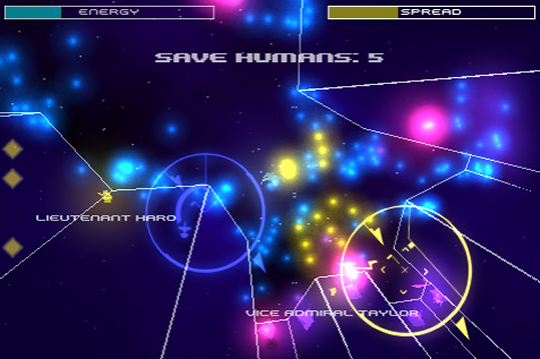
The widely-admired Thrust/Gravitar
clone Dropship. Pretty lights!
This reporter is certainly one of those
people. As someone who's been playing games eight or more hours a day
for the last 30 years (so who the hell are you calling "casual"?),
with every passing day I feel more and more distant from the trainspotting fanboy nerdfest that is the gaming mainstream. I flip
listlessly through the pages of GamesTM or Edge, desperately hoping
for something, anything, to catch my eye that isn't Grey Space
Marine Apocalypse 12 or yet another glorified 21st-Century
version of Dungeons And Dragons but played with a joypad instead of
20-sided dice and a rulebook. The search is rarely successful.
I literally don't remember the last
time I bought a boxed game for more than £17 or spent more than £20
on them in any given month, but in the five weeks or so that I've
owned an iPod Touch I've spent £81 in the App Store, on games which
between them probably cost far less to develop than a single
average Xbox 360 release, and with none of the risk. (For either the
publisher or me.) It's obvious to anyone with a brain in their head
where the smart money is.
Videogaming is going to change
radically in the next five years, on that pretty much everyone is
agreed. But the people who are currently predicting the total death of the boxed-software
market are silly fantasists. The 360 and PS3 and Wii will be with us
for a good few years yet, and we might yet even see one more
generation of physical-media consoles. (Though probably not from
Sony, who can't afford it any more and will have to desperately try
to make the PS3 last another decade.) There's still money to be made catering
for the ultra-conservative, ultra-predictable 13-year-old-fanboy
audience that wants more of what it already knows with incremental
improvements, new costumes and lots of fanservice.
Beyond any reasonable doubt, though,
the industry's focus is going to shift dramatically in favour of the
"casual" demographic, because it's far bigger, far less expensive to
develop for, far less risky and - and here's the kicker - has far
more cash to spend. Now that the main barrier to accessing that
market (the hellish nightmare of non-standard hardware and abysmal
distribution structure that previously crippled mobile-phone gaming)
is gone, stand back and watch the games business descend on the
"casuals" like
a pack of starving wolves.
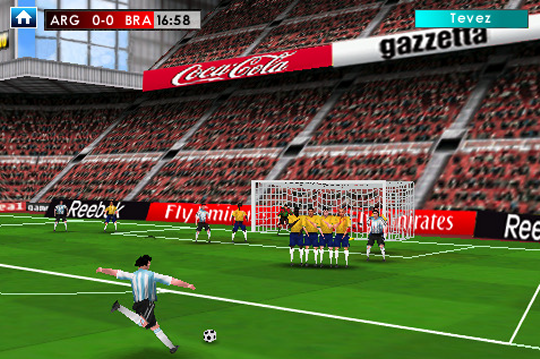
This pic should not be taken as an
endorsement of Real Football 2009, which is dire.
As it stands, the hardware still isn't
quite up to he job. As noted above, battery life is still too poor
and the (perceived) cost of entry is still too high. But Apple are
constantly developing the system along intelligent upgrade routes,
and some day soon they're going to employ someone with the sense to
aggressively market the iPod Touch as a handheld games machine which
also just happens to smash the DS and PSP to pieces as a media
player as well.
Nintendo's machine is showing its age
now, and the PSP has been dead as a gaming platform for two years.
The comically, insanely overpriced PSP Go will ironically probably
serve only to draw people's attention to how relatively attractive
the iPod is as an option, and Nintendo have painted themselves into
a bit of a corner with the DS - what could you do to improve it
while still retaining backwards compatibility? (Which Apple, almost
alone among the belligerents in the games market, has realised is
so vital to building a brand.) As
brilliant as the DS is, the half-arsed and cynical tweaking
represented by the DSi illustrates just what a tricky position the
world-beating format is in when it comes to moving forwards.
Within the next year to 18 months (can
you really see the DS still being a significant force by Christmas 2010?), Apple
will to all intents and purposes have the handheld market to itself.
Microsoft and Sony, meanwhile will be ensnared in a python-like trap
of ever-tightening
circles, unable to focus more strongly on the "casual" market
through XBLA and PSN for fear of alienating their core market.
(Because if you make downloadable games too good you destroy the
boxed-game sector and the hugely lucrative licensing fees it brings
in. Plus you need to address the severely-limited hard disk space
currently available, which in turn either lands your consumers with
off-putting additional expense and facing a lot of faffing to copy
their existing content across to it, or fragments your market
horribly.)
They'll be left serving up the same
increasingly tired and stale products over and over again to a
demographic that can see fashion moving elsewhere, and is already
intimately familiar with interacting with electronic devices in
their pockets. Slowly but surely, gaming is going to drift further
and further into the mobile arena.
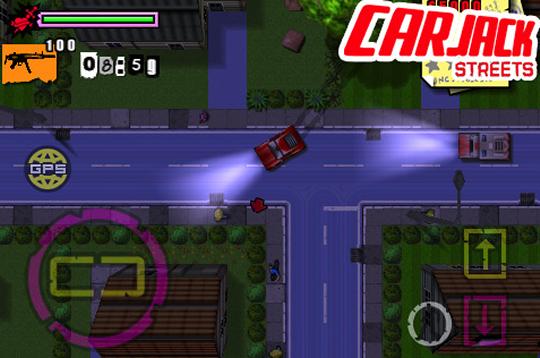
GTA on the DS: £30. GTA on the iPod: £1.79. You
decide.
Apple still needs to smarten up its
thinking a bit. It needs better battery life, maybe a gaming-focused
model of the iPod with a tiny real d-pad and a couple of buttons
(there's already room within the form factor without making the
machine any bigger) and some games-focused marketing, and/or some
more accessible contract options for the iPhone. And ideally, it
needs to kill whoever is responsible for the PC version of iTunes
with a brick. But make no
mistake, the games market is there for the taking, and sooner or
later Apple - which until recently had still been taken by surprise
by the success of the App Store - is going to turn its heavy guns on
it. If you care about videogames at all, viewers, get yourself an iPod.
|

